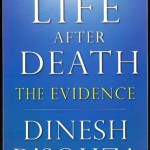What Racism Reveals About God and Man
by Joe Heschmeyer
Filed under Morality, Natural Law
A day after Thanksgiving, with the turkey and stuffing settled in our stomachs, it's a good time to reflect on one aspect of the holiday often ignored: historically, this was a day in which Americans were encouraged to call upon God both in gratitude for His blessings, and to ask mercy for our sins.
We see seeds of this in Lincoln's 1863 Thanksgiving proclamation, the source of the modern holiday, in which he reminded Americans of “the gracious gifts of the most high God, who while dealing with us in anger for our sins, hath nevertheless remembered mercy.” It's clearer in prior Thanksgiving proclamations (for example, James Madison's 1814 proclamation of a day intended for “a devout thankfulness for all which ought to be mingled with their supplications to the Beneficent Parent of the Human Race that He would be graciously pleased to pardon all their offenses against Him”).
In 1865, President Andrew Johnson proclaimed the third modern Thanksgiving by setting apart
"a day of national thanksgiving to the Creator of the Universe for these great deliverances and blessings. And I do further recommend that on that occasion the whole people make confession of our national sins against His infinite goodness, and with one heart and one mind implore the divine guidance in the ways of national virtue and holiness."
So let's talk about one of “our national sins,” racism. Whether you're recounting to your kids the story of the first Thanksgiving, and have to explain what happened to the Wampanoag Indians; or explaining how President Lincoln made Thanksgiving a national holiday while fighting to save a nation and liberate a race of people from chattel slavery (which then-Senator Obama referred to as “this nation's original sin”); or simply taking a break from Thanksgiving festivities to watch the news, only to see a nation in flames over the shooting death of Michael Brown, racism is an unavoidable reality.
I'm not going to write an essay explaining that racism is evil. I'm confident that you know this already, even if you struggle with racism personally. And in describing racism as “evil,” I use the term advisedly. We recognize—virtually all of us, anyways—that racism isn't just mistaken, or factually incorrect, but actually a moral ill. This is why the Washington Post's Alyssa Rosenberg can casually refer to the racist as “a wholly bad person.” She doesn't need to explain or defend this association, because she can count on her readership sharing her sentiment.
Instead, what I want to explore is what we can learn from our moral intuition. If we're right that the racist (or, in any case, racism itself) is evil, what does this tell us about human rights, metaphysics, and God?
I. Why Racism is Evil: The Universal Equality of Man
If you were asked why racism is evil, I suspect your answer would involve something about the idea of the universal equality of man. America was famously founded on the proposition that all men are created equal. At the time those words were penned, one race of Americans was being used as slaves, one race was being exterminated, and women and non-landowners had very little political voice. We weren't, as a nation, actually living as if our Declaration of Independence was true, nor have we always done so in the years since. But we really do believe those five words, and they've served as a veritable engine of social justice.
This notion of fundamental human equality is also the basis for international human rights law. Article 1 of the Universal Declaration of Human Rights reads: “All human beings are born free and equal in dignity and rights. They are endowed with reason and conscience and should act towards one another in a spirit of brotherhood.” And it is precisely this “recognition of the inherent dignity and of the equal and inalienable rights of all members of the human family [that] is the foundation of freedom, justice, and peace in the world.”
This is why we rightly view racism as an evil. It strikes at the very root of our belief in the universal equality of man. For example, consider the white supremacist who believes that members of his race are superior because they're more intelligent than other races. That's not primarily a question about the latest social sciences on how well different racial groups perform on IQ tests, or how legitimate IQ tests are, or anything else. Underlying all this, we're confronted with a question about the foundations of human dignity. Is the worth of human beings something that can be determined by skin color, or by any sort of test, or by any of the countless other markers by which we can separate ourselves from one another? Because if all men truly are created equal, it's because our inherent dignity is rooted in something deeper, in our common humanity.
When we take seriously this idea of basic human rights, owed to us simply due to our humanity, we repudiate all manner of injustice, from racism to sexism to abortion. But these rights also point to a bigger reality, namely the existence of God.
II. Universal Human Rights, the Equality of Man, and the Need for God
So most of us share these foundational beliefs about human rights and dignity. But atheistic materialism can't get you to universal human rights or the equality of man. As Ross Douthat asked Bill Maher, “Where are human rights? What is the idea of human rights, if not a metaphysical principle? Can you find universal human rights under a microscope?”
The Declaration of Independence recognized this. Remember that the Declaration didn't suddenly make all men equal. Rather, it simply recognized that we already were equal, prior to the law. That's why the Declaration describes these realities in theistic and natural law terms: “We hold these truths to be self-evident, that all men are created equal, that they are endowed by their Creator with certain unalienable Rights, that among these are Life, Liberty and the pursuit of Happiness.”
These aren't rights that are invented by the state or by the crowds; these are rights that we have inherently, rights which the state and the mob must recognize. If they came from the state, then they wouldn't be human rights at all, but civil rights. And what the state giveth, the state can taketh away. Obviously, corrupt states and corrupt men can violate human rights; the point here is that they can't repeal them. They're unalienable.
Indeed, the whole point of saying something is a human rights violation is that the victim had rights that the state or the masses ought to have respected. It's why slavery was wrong even when the government and the majority of people condoned it. And it's also why, when corrupt southern states imposed Jim Crow laws, and lynch mobs threatened the basic rights of African-Americans, there was a higher law to which African-Americans could appeal, above the level of the mob or the state.
The Catholic philosopher Jacques Maritain, one of the principal drafters of the Universal Declaration of Human Rights, recognized this, explaining that the “philosophical foundation of the Rights of man is Natural Law.” For human rights to exist in any meaningful way, they must be rooted in natural law, in something coming from before and above the level of the nation-state or the masses.
III. The Unsavory Alternatives
Having said all of this, where does this leave atheists? Not in a good place. On atheism, fellow man is nothing more than a mere collection of material parts, none of which are inherently dignified. And he, like you and I, is ultimately nothing more than a cosmic accident. In such a world, how can he or we have any rights to begin with, except for the rights that the state or the masses decides to give us?
Human rights, as we've seen, can't be meaningfully grounded in the masses or in the state; after all, these rights are often needed precisely to protect us from the masses and the state. We need the existence of something like natural law, and law based on much more than instinct or the like. If natural law is just instinct, why ought we listen to it or obey it?
Likewise for the equality of all men. What exactly is the basis for this equality, if not our shared endowments from our Creator? Theists hold that our equality is ontological, related to the sort of beings that we are. We're each made in the image of God, and we're each endowed with certain rights and dignity, which we share in common. But ontology is blatantly metaphysical, and this particular belief appeals quite directly to God. Without that theistic appeal, the whole thing seems to fall apart.
The most you can say without God would appear to be that all men are of equal social utility. But of course, that's untrue, and obviously so. Some people are born with serious handicaps; others are born into extreme privilege. By any purely-material criteria, some people are born better or worse off than their peers. So, without any connection to the Creator, “all men are created equal” reduces to a meaningless bromide. It sounds nice, but deep down, we don't believe it.
Let's return once more to our port of departure, racism. If your view is that human dignity and human worth is rooted in our intelligence, our physical ability, our life expectancy, our freedom from pain (or conversely, our ability to feel pain), and the rest, the most that you can say is that you're only conditionally not a white supremacist. Tomorrow, some double-blind gold-standard study could come along showing that whites (or some other racial or ethnic group) outperformed their peers in these categories, and you'd be forced to that they have more dignity and worth than members of other racial and ethnic groups.
Such an absurd result reveals the poverty of atheistic materialism; it fails to account for our most basic moral intuitions, and it fails to explain how we can know that racism is a moral evil. Since we do know that racism is evil, we can know with equal certainty that our brother is more than a collection of purely-material parts. During this time of thanksgiving, we should rejoice and be thankful to God for our shared human dignity, and we should take this chance to entreat His forgiveness for our individual and national sins, not least of which is racism.
Related Posts
Note: Our goal is to cultivate serious and respectful dialogue. While it's OK to disagree—even encouraged!—any snarky, offensive, or off-topic comments will be deleted. Before commenting please read the Commenting Rules and Tips. If you're having trouble commenting, read the Commenting Instructions.













